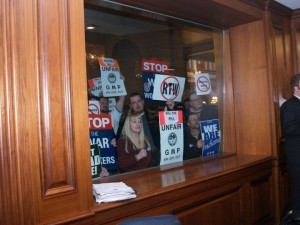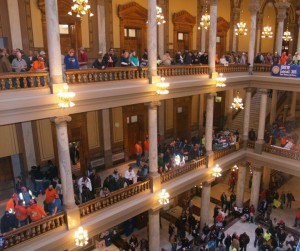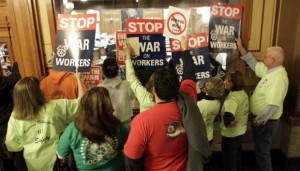Take a break from all the labor! Continue reading
unions
Today, Crasstalk is thrilled to present a conversation with Indiana Democratic Representative Terri Austin (IN-37). Rep. Austin was one of two Democratic legislators who remained at the Statehouse to object to any legislative business occurring without a quorum. A leading voice in education, mass transit and transportation, Rep. Austin has spent the last two weeks traveling back and forth from the Indiana Statehouse to Urbana, Illinois, where the remaining Democratic caucus members have been since the standoff began.
As they enter their third week of boycotting the Indiana House of Representatives, Indiana Democratic legislators are facing enormous pressure from all sides. On one side, there are calls for them to come to the Legislature and go back to work. On the other, countless Hoosier workers and teachers who have rallied day after day, numbering in the thousands each time, to show their support for the Democrats’ stand. What is happening in Indiana is different than what is occurring in Ohio and Wisconsin. However, there are also common themes threaded through each states’ stand off. For many, the events in Indiana and across the country represent no less than a battle for the future of the American working class. Are unions a thing of the past? Do public employees deserve collective bargaining? These are just a few of the questions raised by this situation.
Indiana Democrats released the following statement about the boycott.
On Tuesday, February 22, 2011, House Democrats used their constitutional obligation to prevent quorum on the House floor to stop a radical agenda that was a direct attack on working Hoosiers and our public schools. We left for Illinois to give the thousands of Hoosier workers, teachers, and families a real voice at the State House. Our decision was to send a message to Republicans that we were serious about our concerns. Some say we should come back and do our job. We believe that fighting on behalf of thousands of Hoosier students, workers, and families is our job. To sit in the chamber and simply vote no was not enough.

Before focusing on the substance of why Democratic legislators left the state, I want to ask you about the tactic of walking out or boycotting the legislature. Some have suggested that this is not an appropriate way for a minority party to block legislation. How do you respond to this criticism?
Rep. Austin:
I have great respect for our legislative institution and its rules. The tactic of quorum-busting—causing a quorum to be prevented from meeting—has been used in legislative bodies by minorities seeking to block the adoption of some measure they oppose. Quorum-busting has been used for centuries. For instance, during his time in the state legislature, Abraham Lincoln, leapt out of a first story window (the doors of the Capitol had been locked to prevent legislators from fleeing) in a failed attempt to prevent a quorum from being present.
To remain out of the House chamber should be used rarely and done only after careful consideration. We know that Speaker Bosma and other House Republicans understand this, because when in the minority, they used this Constitutionally-granted ability in 2001 and 2004.
Both Republican and Democratic members have participated in walkouts that have stopped legislative action. However, in the recent past, members have not left the state. Why did the Democrats feel they needed to leave the state?
Rep. Austin:
The decision to leave the state was made after careful deliberation. There was significant concern that the Speaker of the House or the Governor would use the powers of arrest to compel attendance. The only way to ensure that this would not happen was to relocate to a region where the powers of arrest were not recognized. It also gave us uninterrupted time to review, discuss and debate the various pieces of legislation we were concerned about and to develop proposed amendments to the bills. We believe that the legislature works best when a spirit of bipartisanship and compromise is present.
Indiana House members initially left the state to stop Right to Work legislation  from passing. Why is the Democratic Caucus opposed to RtW?
from passing. Why is the Democratic Caucus opposed to RtW?
Rep. Austin:
The decision to break a quorum was not just about Right To Work. Over the last couple of weeks the barrage of controversial and critical bills, put on the calendar at the last minute, hampered the ability of legislators and the public to understand the details of these bills much less consider their long-term consequences. Let me give you an example of what I mean.
The RTW bill was scheduled on the very last morning for committee hearings. The hearing was held in less than ideal conditions. There were hundreds of people who traveled to the statehouse to testify regarding the bill. Many could not even hear the testimony because the hearing room only held about 50 people. Others were forced to stand outside in the hallway or throughout the building. 92 people who signed up to testify were not given an opportunity to testify.
It is important to note that there was conflicting testimony on the positive impact of RtW legislation in other states. Dr. Gordon Lafer, an Associate Professor at the University of Oregon indicated that all of the most recent scientific studies show that RTW has zero impact on job growth. In fact, only one state, Oklahoma, has adopted Right To Work over the past 25 years. One problem with basing public policy decisions on what happened in 1970 and 1980 is that we live in a fundamentally different economy today.
Something this important should not be determined in a 90 minute committee hearing where Hoosiers were denied an opportunity to hear the testimony or offer their thoughts and opinions as citizens.
I think you can see from this example and news reports of the session that legislators and the public were not fully educated on several bills that were moving like a runaway freight train. Although the “Right to Work” (RTW) bill has been depicted as the primary reason for the “time out”, it was a whole list of concerns. This time out has given the public and legislators the time to learn about the content of these bills. As can be noted by the thousands of citizens who have demonstrated at the statehouse and rallied in their communities, the public is becoming more aware of these issues, and they are speaking up. The focus of this time-out should not be the absence of the House members but the potentially damaging impact of these bills.
Almost immediately after the Democrats left, Republican leaders pledged not to advance the RTW legislation. But, the Democrats did not come back. Why?

Rep. Austin:
As explained above, there were other pieces of legislation that would have had a drastic impact on Hoosier families and children attending public schools. Democrats’ decision to remain out of the statehouse allows time for the bills to be fully examined, amendments developed, the public to be informed and their voices to be heard. The Democrats have consistently expressed a desire to work in a spirit of compromise and negotiation. Efforts to do just that have been rebuked and refused by the House leadership. Republicans have said there is no negotiating, their agenda will pass. Their rhetoric and unwillingness to compromise have forced us to fight from Illinois – our only means left to defend the jobs of working people in Indiana and the education of Hoosier children.
This session began with a great hope of working with our colleagues across the aisle to develop a plan for job creation, move our public schools to the front of the class and draft a fiscally responsible state budget. Speaker Bosma started this session saying it was a “new day” in the House chamber, and he was going to seek a new level of bi-partisanship. Unfortunately, we’ve seen the complete opposite. This session has seen only 29 percent of the votes be cast in a bipartisan manner. Normally, 80-90 percent of the votes in a session are bipartisan.
Please understand that House Democrats did not cross our arms and say “no” to everything that was proposed by our Republican colleagues. Even if we disagreed on a bill, positive and compromising alternatives were offered to improve and/or moderate the consequences if we felt they were harmful to our districts and our constituents. Most times those ideas, offered in good faith, were summarily dismissed Our kids’ education and our families’ wages shouldn’t be the victim of partisanship. Hoosier families deserve better than that.

Do Democrats have a list of specific bills that they want to negotiate on before agreeing to come back? If so, can you briefly explain what they are?
Rep. Austin:
There is no list of “demands” as has been suggested. However, several bills impacting public education and the future of the middle class in Indiana are of great concern. HB 1003 creates a voucher program that sends public tax dollars to private schools for a select number of children. HB 1479 allows for the immediate state takeover of 212 schools and gives the State Board of Education the authority to appoint a for-profit management company to run the school. Other legislation impacts individuals’ rights to voluntarily have association dues or fees paid from their paycheck. Others greatly restrict employees’ ability to work with management regarding areas of mutual concern. Many of the bills will drive down Hoosier wages and benefits. Hoosiers already earn only 85 cents on the dollar as compared to the U.S. average. The Republican proposals have been proven in other states to lower wages by $5,500 a year on average.
These are just some of the bills that many legislators feel will be harmful to their communities.
Are the Democrats asking for specific legislative changes to be agreed to before you will come back or are you asking for an opportunity through open debate and proposed amendments to change them once you do come back?
Rep. Austin:
The Democrats are willing to work with everyone in a spirit of compromise. Negotiations are never successful when one party or the other draws a line in the sand. It is important to keep the lines of communication open and for both parties to come to the table with respect and a willingness to listen.
The Crasstalk community includes people from all 50 states. It seems that the same legislation Indiana Democrats are objecting to is also being proposed in other states, notably Wisconsin and Ohio. Are Democratic legislators talking across states and coming up with a larger strategy to counteract what seems to be a nationwide Republican effort?
Rep. Austin:
I am not aware that talks with other Democratic legislators are going on to develop a strategy. I do know that the communications that have taken place are more about supporting each other’s efforts and comparing different pieces of legislation across state lines.
Are you personally concerned about any political fallout from the Democrats’ boycott? Why or why not?

Rep. Austin:
At some point, you have to stand up for what you believe in, regardless of the consequences. I was elected by the people of the district to try and make their lives better and to be their voice in state government. Many of the pieces of legislation would not have a positive impact on the families and children that I represent. I believe that Hoosier families are worth fighting for.
Last question. Many people who will read this are not Hoosiers and may have never been to Indiana. As an elected representative of Hoosier residents, what is the one thing you would most like them to know about Indiana?
Rep. Austin:
It’s a wonderful place to grow up and to work. Yes, we face some challenges but also we have many positives that make us attractive to young people, families and entrepreneurs. I had the opportunity to travel to Taiwan and Japan several years ago as a part of a state delegation. When we met with business leaders who talked about why they brought their companies to Indiana, they indicated two things that set us apart: our Hoosier work ethic and the excellent education their children received. Unfortunately, some leaders forget to tell people the things they are doing well before they tell them why we need to do things differently.
For More Information
Indiana House Democrats Fighting for Hoosier Families Facebook page.
Just SIT (Support Indiana Teachers) Facebook page.
Taking the right wing’s common hypocrisy to mind-numbing new heights, three major conservative commentators – who have been harshly critical of the demonstrations in Wisconsin by union members – all belong to the American Federation of Television and Radio Artists union (AFTRA), which is the AFL-CIO affiliate for television and broadcast workers.
Rush Limbaugh, Sean Hannity and Bill O’Reilly have have all been outspoken in their lack of sympathy to the struggles of public employee unions in Wisconsin. A representative for Glenn Beck denies that he is a union member, although it’s puzzling as to how that may be, since he, Hannity and O’Reilly famously all work for the same news organization.
 According to AlterNet.org, which posted the story on February 26, 2011:
According to AlterNet.org, which posted the story on February 26, 2011:
On Feb. 18, Limbaugh said on his radio program, “We are either on the side of the Wisconsin protesters or we are on the side of our country.” Hannity has featured several guests critical of the union and its supporters, including Wisconsin Gov. Scott Walker, on his Fox News television and radio shows.
On the Feb. 18 edition of “The O’Reilly Factor,” O’Reilly stated, “Governments can’t afford to operate” because of “union wages and benefits.” But it turns out that opposing workers’ rights isn’t the only thing these blowhards have in common.
To read the rest of the story go here.
AFTRA card photo here.
College dropout and Race to the Bottom cheerleader Scotty Walker is soon to have a brother in arms. In Ohio, former Fox News host and former Lehman Brothers executive-turned-governor John Kasich and the GOP majority are on track to pass a distinctly similar bill to the one on the table in Wisconsin.
Much like Walker’s bill, the Ohio proposal would strip public employees in Ohio of the right to collectively bargain for pay and benefits. This would be on top of the concessions that have already been requested (and mostly agreed to), and further, limit the effects of binding arbitration.
And, much like Wisconsin, public sector employees in Ohio are filling buses and making their way to Columbus in volumes generally reserved for Ohio State-Michigan football games.
Within the state, the familiar battle lines are being drawn, while eyes focus on Wisconsin. The assumption is that if Wisconsin caves to the demands of Koch-driven politics, that Ohio will be the next domino to fall, right on the backs of what remains of the middle class.
It seems almost sure to happen, eventually, though. Kasich isn’t the type to let up. He has his mandate, (and no, I’m not talking about the glorious 49% of the vote he received last November) and seems determined to deliver it to us: You will fight for scraps, and be grateful for the opportunity to do so.
Sadly, there is support for this, which, if you listen to a lot of the folks online and in the papers, seems counterintuitive. The argument I witness most frequently is that if the private sector isn’t ‘able’ to give employees benefits like those currently enjoyed in segments of the public sector, then the public sector employees shouldn’t be entitled to the benefits that they’ve currently bargained for. This, I have a problem understanding. The fact that the private sector has slowly and steadily taken things away from the middle class means that we should screw what’s left of it over? Seems like we’re picking the wrong scapegoat.
So, we’ll likely see a repeat of what’s happening in Wisconsin here in Ohio. Thousands of public sector employees, with organizational help from the unions, will make their way to the state capitol to voice their discontent. Some Koch brothers’ funded group with a happy-sounding name will bus in a few hundred Medicare recipients (some from out of state, I’m sure) who are too stupid to realize that they’re spitting in the wind, and have them counter protest.
In the end, the Republicans will have the votes they need to pass these bills, and we can get to partying like it’s 1929.
Since labor troubles in 1987 cancelled one game and saw replacement players in NFL uniforms, labor issues have been minor compared to the other major American sports leagues. The NBA, NHL, and Major League Baseball have all seen seasons cut short (or cancelled altogether) as a result of labor strife. Now the NFL is facing a real possibility of losing games in 2011.

The main issue in labor talks is how to split up the reported $9 billion in revenue the league and its teams take in each year. Under the current Collective Bargaining Agreement (CBA), the first $1 billion off the top belongs to the team owners. Of the remaining revenue, 60% goes toward player salaries while the balance goes to the owners and team expenses. The owners claim that rising costs are directing most of the profits toward the players, and that they should receive a bigger portion of the $9 billion. Some of their proposals involve increasing their primary allocation from $1 billion to $2 billion and reducing the 60% of the excess revenue that goes to the players. Their position is that they no longer want to pay the players as much as they are.
There is a key bargaining difference between “not wanting to pay” and being “unable to pay”, and that’s a main sticking point for the NFL Players Association. If the owners came to the bargaining table and claimed they could not afford to pay the players, the NFLPA would have a legal to right to examine owners’ financials. NFL owners, however, have claimed that general economic difficulties are resulting in an overall strain on profits. Essentially, they’re saying “We can pay you that much, we just don’t want to.” Under established labor law, the NFLPA has no rights to see team financial statements if this is the case. Players do have audit rights, but owners are only obligated to show them team revenues and not expenses.
So what happens now?
Many expect that an agreement will not be reached before the current CBA expires on March 3rd, and the owners will lock out the players shortly thereafter. This will affect the off-season in a number of ways until a deal is reached:

- The NFL draft will still happen in late April, but teams will not be able to sign their draft picks, trade draft picks that involve a current NFL player, or sign undrafted rookies. The teams will essentially pick their guy and then wait until a new CBA is hashed out.
- Free agents are out of luck. Players whose contracts have expired cannot sign with another NFL team while players are locked out. They could go play for a team in another league like the CFL or UFL.
- Players under contract will not be paid, and (most likely) could not play for another league. Teams could not bar a player from working at all, but could possibly bring legal action if a player participated in another football league. During the NHL’s cancelled 2004-05 season, many players went to Europe and played professionally there, and owners had no issues. NFL owners have already stated they might.
- Head coaches will most likely be paid during a lockout, but their assistants most likely will not be. Coaches’ contracts are written differently from those of players and assistants, and most will continue to receive full salaries even if no football is played.
The implications become much greater if a deal still hasn’t been reached in August, when teams are ramping up for the regular season. A shortened pre-season or regular season would be the most innocuous result. Replacement players have and can be used if the owners want to stage the games.

The worst possible scenario is one where a deal still hasn’t been reached well into the fall which results in a cancelled season and no Super Bowl.
In any labor negotiation, both sides want to feel like they stood up for their constituents and fought as hard as they could. This is the main reason why a deal most likely won’t be done before August. Any conclusion before then will make it look like one side gave in and let the other side win. I wouldn’t expect a deal before August or September with the most likely effect being a shortened season. In the end, I think the billionaires will win out over the millionaires, owners will get their concessions, and the game will go on.
In the meantime, most fans (yours truly included) will continue to freak out about the possiblity of no NFL in 2011. I don’t even want to think about all the time I spend watching NFL network in the summer hearing about how my favorite players have been arrested or showed up to camp overweight. The thought of having to work after 2pm on Fridays and Tuesdays, key times for fantasy football owners, frightens me more than birds do. (And I REALLY hate birds.) But most devastatingly, the thought of spending Sundays at home instead of at a bar watching the Vikings sends chills down my spine. Don’t get me wrong, I love my family, but COME ON.
Let’s all just hope that this gets worked out and such fears aren’t realized. If August is on our calendars and labor issues remain, we’ll circle back and figure out what the hell to do with our lives.
